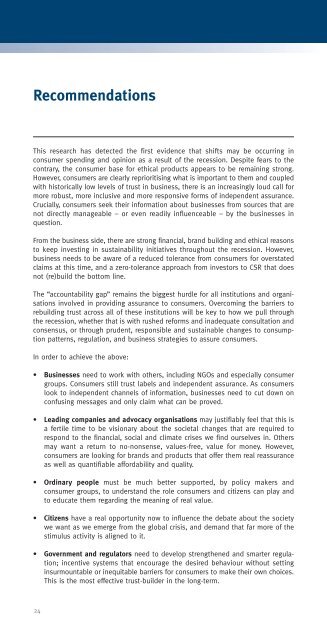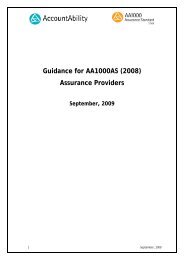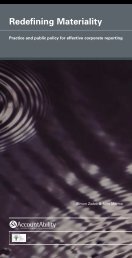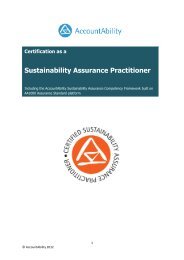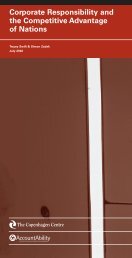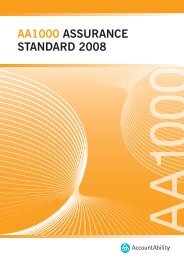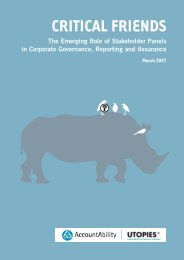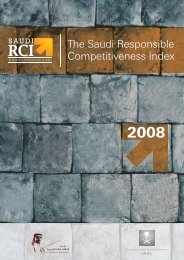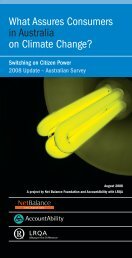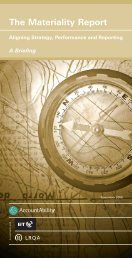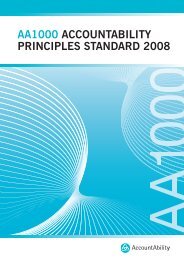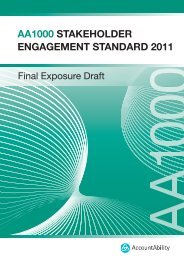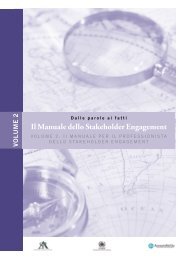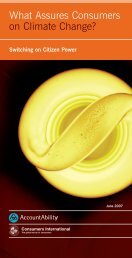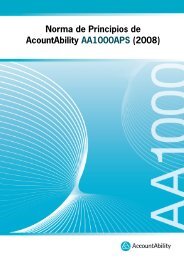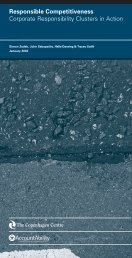What Assures Consumers in an Economic Downturn? - AccountAbility
What Assures Consumers in an Economic Downturn? - AccountAbility
What Assures Consumers in an Economic Downturn? - AccountAbility
Create successful ePaper yourself
Turn your PDF publications into a flip-book with our unique Google optimized e-Paper software.
Recommendations<br />
This research has detected the first evidence that shifts may be occurr<strong>in</strong>g <strong>in</strong><br />
consumer spend<strong>in</strong>g <strong>an</strong>d op<strong>in</strong>ion as a result of the recession. Despite fears to the<br />
contrary, the consumer base for ethical products appears to be rema<strong>in</strong><strong>in</strong>g strong.<br />
However, consumers are clearly reprioritis<strong>in</strong>g what is import<strong>an</strong>t to them <strong>an</strong>d coupled<br />
with historically low levels of trust <strong>in</strong> bus<strong>in</strong>ess, there is <strong>an</strong> <strong>in</strong>creas<strong>in</strong>gly loud call for<br />
more robust, more <strong>in</strong>clusive <strong>an</strong>d more responsive forms of <strong>in</strong>dependent assur<strong>an</strong>ce.<br />
Crucially, consumers seek their <strong>in</strong>formation about bus<strong>in</strong>esses from sources that are<br />
not directly m<strong>an</strong>ageable – or even readily <strong>in</strong>fluenceable – by the bus<strong>in</strong>esses <strong>in</strong><br />
question.<br />
From the bus<strong>in</strong>ess side, there are strong f<strong>in</strong><strong>an</strong>cial, br<strong>an</strong>d build<strong>in</strong>g <strong>an</strong>d ethical reasons<br />
to keep <strong>in</strong>vest<strong>in</strong>g <strong>in</strong> susta<strong>in</strong>ability <strong>in</strong>itiatives throughout the recession. However,<br />
bus<strong>in</strong>ess needs to be aware of a reduced toler<strong>an</strong>ce from consumers for overstated<br />
claims at this time, <strong>an</strong>d a zero-toler<strong>an</strong>ce approach from <strong>in</strong>vestors to CSR that does<br />
not (re)build the bottom l<strong>in</strong>e.<br />
The “accountability gap” rema<strong>in</strong>s the biggest hurdle for all <strong>in</strong>stitutions <strong>an</strong>d org<strong>an</strong>isations<br />
<strong>in</strong>volved <strong>in</strong> provid<strong>in</strong>g assur<strong>an</strong>ce to consumers. Overcom<strong>in</strong>g the barriers to<br />
rebuild<strong>in</strong>g trust across all of these <strong>in</strong>stitutions will be key to how we pull through<br />
the recession, whether that is with rushed reforms <strong>an</strong>d <strong>in</strong>adequate consultation <strong>an</strong>d<br />
consensus, or through prudent, responsible <strong>an</strong>d susta<strong>in</strong>able ch<strong>an</strong>ges to consumption<br />
patterns, regulation, <strong>an</strong>d bus<strong>in</strong>ess strategies to assure consumers.<br />
In order to achieve the above:<br />
• Bus<strong>in</strong>esses need to work with others, <strong>in</strong>clud<strong>in</strong>g NGOs <strong>an</strong>d especially consumer<br />
groups. <strong>Consumers</strong> still trust labels <strong>an</strong>d <strong>in</strong>dependent assur<strong>an</strong>ce. As consumers<br />
look to <strong>in</strong>dependent ch<strong>an</strong>nels of <strong>in</strong>formation, bus<strong>in</strong>esses need to cut down on<br />
confus<strong>in</strong>g messages <strong>an</strong>d only claim what c<strong>an</strong> be proved.<br />
• Lead<strong>in</strong>g comp<strong>an</strong>ies <strong>an</strong>d advocacy org<strong>an</strong>isations may justifiably feel that this is<br />
a fertile time to be visionary about the societal ch<strong>an</strong>ges that are required to<br />
respond to the f<strong>in</strong><strong>an</strong>cial, social <strong>an</strong>d climate crises we f<strong>in</strong>d ourselves <strong>in</strong>. Others<br />
may w<strong>an</strong>t a return to no-nonsense, values-free, value for money. However,<br />
consumers are look<strong>in</strong>g for br<strong>an</strong>ds <strong>an</strong>d products that offer them real reassur<strong>an</strong>ce<br />
as well as qu<strong>an</strong>tifiable affordability <strong>an</strong>d quality.<br />
• Ord<strong>in</strong>ary people must be much better supported, by policy makers <strong>an</strong>d<br />
consumer groups, to underst<strong>an</strong>d the role consumers <strong>an</strong>d citizens c<strong>an</strong> play <strong>an</strong>d<br />
to educate them regard<strong>in</strong>g the me<strong>an</strong><strong>in</strong>g of real value.<br />
• Citizens have a real opportunity now to <strong>in</strong>fluence the debate about the society<br />
we w<strong>an</strong>t as we emerge from the global crisis, <strong>an</strong>d dem<strong>an</strong>d that far more of the<br />
stimulus activity is aligned to it.<br />
• Government <strong>an</strong>d regulators need to develop strengthened <strong>an</strong>d smarter regulation;<br />
<strong>in</strong>centive systems that encourage the desired behaviour without sett<strong>in</strong>g<br />
<strong>in</strong>surmountable or <strong>in</strong>equitable barriers for consumers to make their own choices.<br />
This is the most effective trust-builder <strong>in</strong> the long-term.<br />
24


